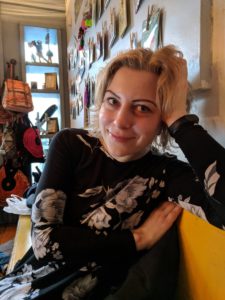1. Tell us a little bit about yourself. Where are you from?
I am a doctoral candidate specializing in Modern Jewish and Russian history. I was born in raised in Ukraine. I did my undergraduate degree there and then received an MA at Central Europe University in Budapest, Hungary. As an international student who has lived in several countries, I was particularly impressed by the American South’s hospitality.
2. What is your favorite book?
My favorite book is “Master and Margarita” by Mikhail Bulgakov. I have read it many times, and every time the intriguing entwinement of the Biblical events, romance, harsh Soviet reality, and mysticism keeps mesmerizing me.
3. What is your favorite thing about Emory/Atlanta?
I admire how green the Emory campus is. My favorite thing is to have lunch sitting right on the grass.
I love hiking, and the Atlanta area has a lot to offer in this regard too.
My favorite place in Atlanta itself is the Centennial Olympic Park. As a little girl, I was following the success of a Ukrainian gymnast, Lilia Podkopayeva. She won the gold medal in the 1996 Olympic games. Therefore, in my mind, the Olympic Park has a connection to my home country, Ukraine. When I am walking there, I feel the spirit of meritocracy and get inspiration for my own work.
4. What are you researching for your dissertation?
In my dissertation, “Imagining Emigration: Crossing the Borders of Russian Jewry during the Era of Mass Migration, 1881-1914,” I trace the economic, cultural, and psychological impact of the mass Jewish exodus from late imperial Russia on the remaining population. By combining a careful study of bureaucratic correspondence and institutional archival records with the Jewish press and emigres’ personal papers in Yiddish, Hebrew, and Russian, I explore the transformation of the Russian-Jewish identities and daily life in the wake of mass migration. The great departure, I argue, transformed life in Eastern Europe, and its repercussions were as tangible in the Russian Empire as in the receiving countries.
5. What interested you about the Woodruff Library Fellowship?
I have applied for the Anne & Bill Newton Graduate Fellowship at Rose Library since the archives have always fascinated me as a historian. I have spent quite a lot of time in the archives collecting material for my undergraduate and master’s theses, as well as the doctoral dissertation. My first encounter with the Rose Library happened in 2015 when I worked there as a manuscript processing assistant. At that time, I was amazed how accessible and user-friendly Rose Library was comparing to the archives in the former Soviet Union, where I was doing my research before. No less, I became fascinated by the thing unheard of in my home country, Ukraine. I mean the public functions of the archive. Sadly, the archives there serve just historians and genealogists. I believe that the archives’ mission should be broader. And as a Newton Fellow, I hope to learn more about the public functions of the archives and implement this knowledge in practice.
6. What will you be working on this year for your Woodruff Library Fellowship?
As a Newton Fellow, I will help organize the two great projects that the Emory Libraries offer to the LGS students annually—the Grant Writing Workshop and the Archives Research Program. This way, I hope to share my experience of archival research and writing successful grant proposals. Besides, I will be creating a user guide for the Jewish Studies collections that the Rose Library holds. I am looking forward to an exciting year as a Newton Fellow.

